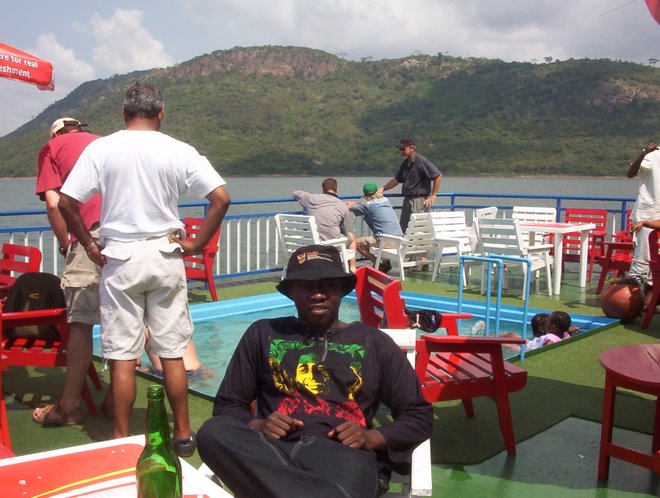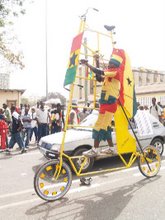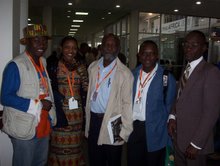 A major landmark achievement and a significant climax to the successful self-determined efforts of artisans at Suame Magazine for their self advancement was chalked last week when a formal technical training centre project for the artisanal engineering sector of the country was launched.
A major landmark achievement and a significant climax to the successful self-determined efforts of artisans at Suame Magazine for their self advancement was chalked last week when a formal technical training centre project for the artisanal engineering sector of the country was launched.
The institute project as has been explained is to help build the technical capacity of auto artisans especially at Suame and other areas of the country so as to enable them meet modern challenges in the automobile industry.
This is because the artisans have been finding it difficult to cope with new auto model vehicles with brain box, chips and diagnostics for repairs due to lack of capacity in modern technology.
The successful launch of the institute which is the first of its kind in the informal artisanal sector has therefore come as a big relief for the artisanal population in the country.
The project is said to be the product of a dream to enhance the professional career of artisans in ways and on such terms as obtains in the formal sector.
It must be stated that the integration of the fitting industry into the formal professional engineering career would mark a significant threshold in the long-awaited industrial revolution in Ghana.
This is because the Suame Magazine in Kumasi seems to be the only untapped option in the attempts at national industrialisation.
Suame magazine is the largest informal sector village in the country accommodating several hundreds of small scale engineering industries, repair works, scrap yards, workshops all with a working population of about 200,000.
The area is a major centre for vehicle repair attracting vehicles from not only Ghana but from neighbouring countries in the West African sub region.
However, the sector faces an eminent collapse if efforts are not made to build capacity of auto artisans to meet modern challenges in the automobile industry.
The area is the economic heart of Kumasi and together with the wood and timber industry completely dominated the economic life of the metropolis in the 1970s and 1980s.
With the virtual collapse of the timber and wood industry and the visible consequences of mass unemployment unleashed on the economy in Kumasi, Suame magazine became the lone surviving industrial estate in Kumasi.
According to experts in the case of the timber and wood industry, even though the signals were clear right from the onset, there was no bold alternative planning intervention initiated to save thousands of families whose livelihood were under threat.
Again the dwindling prospects of the wood industry affected all the sectors of the economy to which the industry shared economic linkages.
The economic soul was virtually lost leaving the economic heart of Suame Magazine to sustain Kumasi’s industrial economy.
According to the experts Suame Magazine is also on the same path dwindling prospects due to the technological advances in the current global automobile industry of which the industrial estate is an integral part.
They claim the very survival of Suame Magazine, the fitting industry in Ghana and even in West African sub region was under serious threat given the pivotal role of Suame Magazine.
This, they claim was due to the inability of the artisans to cope with the sophisticated modern technology that requires the use of ICT Auto diagnostic tools in vehicular repairs for new models of vehicles which are fast replacing the old models.
Given its current status as the only surviving industrial estate and propelling sector of Kumasi, the imminent collapse of the industrial estate as has been projected sends signals of mass unemployment in the metropolis.
Indeed Kumasi could be reduced to a ghost economy without Suame Magazine.
Statistics from the office of the Suame Magazine Industrial Development Organisation (SMIDO) indicates that the area currently has about 12,000 enterprises with over 200,000 working population.
It is thus said to be supporting the livelihood of over 600,000 on the lower variant of three per dependency ratio.
The area could be said to be more of a national and West African sub regional economic constituency whose opportunities are accessed beyond the boundaries of Ghana and also boast of the largest cluster of small and medium enterprises in the sub region.
As the largest informal sector village in Ghana, the area has surprisingly always escaped the policy spectacles of governments since independence in many of the youth employment programmes.
It is for these reasons that the idea of the Suame Magazine Automatics Institute (SMATI) project was moved by the Suame Magazine Industrial Development Organisation (SMIDO), as an attempt to establish a formal training centre for the artisanal engineering sector of the country.
SMIDO, the development unit and umbrella organisation of various artisans at the Suame Magazine has been spearheading the development of the country’s artisanal engineering sector, especially at the Suame Magazine under the auspices of the DANIDA-USAID-DFID sponsored Business Sector Advocacy Challenge (BUSAC) Fund in the last three years.
Vice President John Dramani Mahama launched the technical institure project last week.
A five-member committee, constituted and chaired by institutional representatives of the Ashanti Regional Coordinating Council, the Kumasi Metropolitan Assembly (KMA) and other relevant individual stakeholders have been tasked with the responsibility of implementing the project.
This is to give the metropolitan and the regional authorities an important stake in the project as policy making bodies in the Ashanti region.
Last year, SMIDO launched a similar project to develop a modern industrial village for Suame Magazine under the leadership of Dr Kwabena Duffuor, former Governor of the Bank of Ghana and Professor Kwabena Frimpong Boateng former Chief Executive of Korle Bu Teaching Hospital.
According to Mr Nyaaba-Aweeba Azongo, a consultant to SMIDO the institute project of the organisation’s policy to have an institutional training centre unique to the artisanal engineering setting was to enable artisans cope with the changing technology in the global autuomatics engineering industry.
He said a framework has been designed with three different phases: the basic, secondary and tertiary artisanal engineering levels and a consultancy component to support the endangered sector in Ghana and West Africa.
Mr Azongo said they have with the support of international institutional partners and experts in Ghana designed a curriculum for the Basic artisanal engineering level which has been successfully operationalised over the past six months.
Adding, he said the second and third stages have been well-advanced to facilitate the project to bring all stakeholders on board to properly nurse this dream into reality.
The President of SMIDO, Mr George Asamoah Amankwa threw a challenge to the government to give the artisans the opportunity for them to turn the whole nation around.
Vice President John Mahama in his address at the launching commended SMIDO’s policy to have an institutional training centre unique to the artisanal engineering setting to enable artisans cope with the changing technology in the global automatics engineering industry.
He said seeking to focus attention on harnessing resources to establish an institute to save Suame Magazine from total collapse, precipitated by modern technological innovation and sophistication in the automobile industry, was quite appropriate.
Mr Mahama also mentioned that the vehicular repair cluster at Suame for instance was the most influential cluster around which all other clusters revolved and so if care were not taken and that sector was lost, it would affect all other clusters that depended on it.
“We recognise that if no major interventions are taken now to address the situation, the eminent collapse of this important industrial estate would lead to mass unemployment, poverty and increased crime in Ghana”, he said.
The Vice President said the establishment of the institute was consistent with government’s objectives of creating a better Ghana in so far as it sought to pursue policies for accelerating Ghana’s economic growth.
He also said the establishment of the institute was a typical case of cooperation between industry and academia saying all over the world industries had developed through such collaborations.
He urged SMATI to cooperate with other tertiary institutions, the auto industry and relevant agencies as well as development partners to foster closer collaborations.
He said because there had not been any requisite training for artisans to prepare them to keep pace with the ever-changing global auto technology, they seemed to lack some modern ways of doing things.
There was therefore the urgent need for retraining and retooling of this pool of talents to make them productive so as to make them productive enough to meet national goals.
He said it was only through such a move that the country could move forward in the right direction.
He said efforts were underway to improve the capacity of small and medium scale enterprises to be able to keep simple books of accounts and be able to do business plans.
.JPG)



.JPG)
.JPG)






































